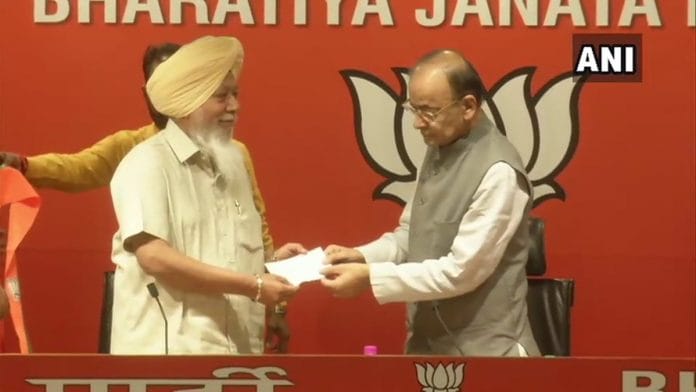Chandigarh: When Harinder Singh Khalsa, the former Fatehgarh Sahib MP, resigned from the BJP Saturday, it brought an end to the once-diplomat’s third stint with a political party. Khalsa cited the BJP’s “insensitivity” to the plight of the protesting farmers as the reason for his decision.
He had joined the BJP ahead of Parliamentary elections in 2019. Before that, he had been with the Aam Aadmi Party (AAP), which he had joined in 2014. Khalsa also had a stint as the Shiromani Akali Dal MP from Bathinda between 1996 and 1998.
A former diplomat whose claim to fame was his resigning from the prestigious Indian Foreign Service (IFS) to protest Operation Bluestar in 1984, Khalsa had been suspended from AAP for “anti-party” activities in 2015. His suspension consequently pushed him to the BJP, but he was not given a ticket by the party to contest again.
The 73-year-old belongs to a political family in Ludhiana. His father Gopal Singh Khalsa was a prominent Dalit leader who was the parliamentary secretary to the Punjab Premier, Sikandar Hayat Khan in the first elected provincial government of undivided Punjab in 1937.
Post-Independence, his father joined the Akali Dal and was the first leader of opposition in the Punjab assembly when the Congress ruled the state from 1952 to 1956. His father, who had studied law in London, encouraged his sons to educate themselves.
With a Masters degree in English, Khalsa began teaching in a college in Ludhiana authoring two textbooks, one on English and another on social science.
Two of Khalsa’s three sons live abroad while one teaches at the Punjab Agriculture University in Ludhiana. Khalsa’s brother Butshikan Singh too was in the IFS and is now retired and lives in Ludhiana.
Also read: This is Vajpayee’s agriculture minister’s advice to Modi govt to end crisis over farm laws
The diplomat who resigned after Operation Bluestar
Khalsa made it to the Punjab Civil Service and a few months later to the IFS in 1974. His first posting took him to Jakarta, where he worked as second secretary. From Jakarta, Khalsa was posted as first secretary in Bangkok.
In June 1984, during his next posting as first secretary in Oslo, Norway, Khalsa resigned in the wake of the Operation Blue Star. The operation ordered by then Prime Minister Indira Gandhi had led to the army storming the Harmandir Sahib (Golden Temple), one of the most revered places of worship for Sikhs.
Following his resignation, Khalsa faced charges of being mixed up with Khalistanis. When Indira Gandhi was assassinated by her Sikh bodyguards, Khalsa’s name cropped up.
The allegations stemmed from the fact that Khalsa’s wife Sukhwant Kaur belonged to Maloya village near Chandigarh. Beant Singh, one of the two bodyguards of Indira Gandhi responsible for her death, belonged to the same village, and allegedly knew Sukhwant from their childhood days. Beant Singh allegedly tried to meet Khalsa during Indira Gandhi’s state visit to Norway in 1983 but the diplomat cold shouldered him.
In an interview to India Today in 1984, Khalsa vehemently denied all these allegations while admitting that he had huge respect for Sikh extremist Sant Jarnail Singh Bhindranwale.
Khalsa applied for asylum in Norway living on government doles and running a small eatery with his wife. He also worked as a postman during that period.
When he returned to India in 1990, he was made the chairman of an NGO, Punjab Human Rights Organisation, to champion the cause of human rights excesses during the militancy days in Punjab. A year later, he was appointed the secretary of the Shiromani Gurdwara Parbandhak Committee (SGPC).
Political career
Khalsa stepped into electoral politics in 1996 when the Shiromani Akali Dal (SAD) gave him a ticket to contest the Bathinda Parliamentary seat. He won by a huge margin of over 92,000 votes.
He remained a member of the SC-ST commission for three years from 1998 in the Atal Bihari Vajpayee government.
Khalsa then fell off the political radar for over 20 years before riding the AAP wave in Punjab during the 2014 Lok Sabha elections. He had joined the party ahead of the parliamentary polls and was elected from the reserved seat of Fatehgarh Sahib, winning by a margin over 54,000 votes.
He was among the four AAP MPs elected from Punjab that year, the rookie party’s debut elections. Khalsa, who had been living a retired life in Ludhiana before the elections, remained largely absent from his constituency after he was suspended by the party in 2015 for anti-party activities.
He along with another elected MP, Dharamvir Gandhi, had objected to over-centralisation in the party and the increasing interference of the AAP high command in Punjab.
In March last year he joined the BJP in the presence of Arun Jaitley. Khalsa was expecting to be given the BJP seat from Amritsar but cabinet minister Hardeep Puri was chosen over him.
Sources in the BJP say Khalsa was feeling suffocated as after Jaitley’s death, he did not have any significant backer in the party.
Also read: Modi govt gave an unwanted gift to farmers. Now it can’t even handle rejection






